Allison M. Dickson's Blog, page 20
July 6, 2012
The Vegan Thing
 If you had asked me five years ago if I would ever give up animal products, I would've laughed my face off and called you insane. Hell, even two years ago. In my mind, the picture of the typical vegan hasn't changed much. For many of them, it's not so much an eating choice as it is a food religion that must be proselytized at every turn. It drives me crazy, and it's one reason I was intending to stay in the closet about this once it finally got under way. But I don't exist well in closets. And I don't want to be lumped into that same cult-like mindset that lot of vegans fall into, whether they want to or not (and I suspect I'm not alone in this in the vegan world). That sort of looking-down-the-nose sniff-sniffism that tends to drive more people to steak than away from it.
If you had asked me five years ago if I would ever give up animal products, I would've laughed my face off and called you insane. Hell, even two years ago. In my mind, the picture of the typical vegan hasn't changed much. For many of them, it's not so much an eating choice as it is a food religion that must be proselytized at every turn. It drives me crazy, and it's one reason I was intending to stay in the closet about this once it finally got under way. But I don't exist well in closets. And I don't want to be lumped into that same cult-like mindset that lot of vegans fall into, whether they want to or not (and I suspect I'm not alone in this in the vegan world). That sort of looking-down-the-nose sniff-sniffism that tends to drive more people to steak than away from it.I don't want to be one of "those people."
And yet, I'm sitting here on the cusp of getting ready to say goodbye to animal products for good. I'm not shedding a tear, really. I'm not doing this to make a statement or to hold myself on high as someone who is better than a carnivore. I'm doing this because the choice has been made for me. My health demands it. I've studied this topic for a couple years now, and I've been intrigued by the numbers and the studies, appalled by the nastiness of the modern food industry, and inspired by what I've seen personally when people like me have made the switch. The astounding improvement in their health and well-being in such a short period of time is actually quite remarkable. I've experimented with varying levels of a meatless existence. Each and every time, I felt tremendously better. Lighter. Happier. More awake. Focused. But it was difficult to maintain for the long term. Probably because I was making it harder than it needed to be.
Of course, it isn't just the animal products. It's the sugars and the bad fats, and the fact that I'm just plain no eating enough vegetable matter. When I've said goodbye to the dairy and the meat and the eggs and replaced those things with plant-based items, I've had such a great ah-hah moment. THIS is what my body is telling me it NEEDS. Which is wholly different than what my body tells me it wants. It wants ice cream, it wants cake, it wants bread and chocolate and cheeseburgers and fries.
I've spent the last 30 years giving my body what it wants. It hasn't done me any favors. And now that I'm approaching my mid-30s, it's time to tell that voice to STFU once and for all and let someone else take the steering wheel. The truth is, I've come to hate most food. Very little of it makes me feel good anymore. In fact, after eating a typical meal, I feel like shit. I drag ass, I want a nap, or I need to run to the bathroom immediately because my body is rejecting it. Apart from my chronic inflammation issues, I've also been having acid reflux, and my asthma is worsening to the point where I have needed my inhaler daily for the last few months. And I've noticed these symptoms increase after I've had certain foods.
This is not how food is supposed to be making me feel.
But then the other night, I had a meal comprised mostly of vegetables and fish. I still remember how good I felt after I ate that meal. How clean that fuel was. How I didn't start wheezing or tasting bile in the back of my throat or how my intestines didn't start spasming.
But fish, you say? That's not vegan. And that's where I'm going next with this. My version of veganism may very well involve some fish or seafood once a week, if I want it. Maybe I won't want it. We'll see. I'm keeping some options open. The point is, I'm just trying to listen. REALLY listen this time to what my body is telling me. It's telling me that it can no longer tolerate the stuff I've been putting into it. It's been telling me that for a number of years, but I no longer have brazen youthful cockiness on my side. I'm crying out for nutrients. I'm being forced to remember the times I've given myself the right fuel and went on to feel like I was ready to take on the world.
I think that's where a lot of the obnoxious behavior from the stereotypical vegans originates. They feel so damn awesome that it becomes their mission to spread their lifestyle, like a gospel. They want to heal the world or something. They have good intentions, but it just backfires because they come off as judgmental douches.
I have no interest in doing that.
But maybe you wonder why I'm writing this blog in the first place. The truth is, I'm writing it because I want people to know that I'm prepared for the criticisms and concerns that will also be thrown my way from people who will wonder if I'm getting enough protein in my diet (this is not even remotely a concern), or who think I'm slowly killing myself or morphing into a hippie. I'm putting this out into the world to let people know that I've done my homework, and I have no reason to worry and neither should you. I also have no interest in trying to change you. Your journey, your choices, your diet decisions are all your own and I just want to be afforded that same respect on the road ahead. In many ways, I suppose it is like a religion. I can't make everyone believe and think the way I do. I came by my views honestly, through an entire lifetime of experiences that took me along a certain path. Even if you share some of my beliefs, your path is going to look different from mine. Besides,I have a lot on my own plate just trying to fix myself right now. I'm not even thinking about your choices.
If, however, you are ever curious about any of the recipes I'm likely to post, or are noticing some of the positive effects of the diet on my health or body and want to learn more, I'll be happy to share whatever information I have.
Ultimately, I was driven to this point. When you feel like shit, and you know what will fix it, there comes a time when you can no longer ignore that option, even if it involves a lot of change and sacrifice. I love cheeseburgers. I probably always will. They just don't love me, and I think it's time we parted ways. My inner hedonist is a little sad, but I think even she is looking forward to the break.
Published on July 06, 2012 06:46
June 27, 2012
Going All Borg on Ebooks

I was wrong. I've become that which I said I never would.
There, I said it. I've put on my big girl panties (which, let's face it, isn't too difficult for someone of my size, but that's beside the point) and have decided it's time to fully own up to something I've known for the last year and a half.
When it comes to reading, I've gone full Nook.
This probably comes as no shock to you. After all, I sell my own writing almost exclusively in electronic format. But it isn't that simple. If releasing in print were anywhere near as easy as it is to release digitally, I'd happily do so. My electronic library is namely a result of my desire to keep things simple. But since e-books have just recently outsold hardcovers for the first time in the U.S., I figure it's now just me staying ahead of the curve. Oh, and by the way, thanks for finally joining the party and putting a few extra bucks in my pocket at the same time. ;)
A few years ago, I swore to myself I would never give up my paper books. I argued with many early adopters about how foolish they were. How senseless it would be to purchase digital copies of books they already owned, especially at upwards of $12 a pop. Even now, I still have a deep attachment to my paper copies, and will probably never give them up despite my loathing of keeping unused things in boxes in garage for years upon years. But the attachment is also pragmatic. Ken and I spent years and lots of money amassing that collection of books, and it's silly to try to replace all of them with electronic copies. We'll likely keep them until they fall to dust in our hands. Maybe the kids will inherit some of them. Maybe they'll take them out of a sense of pity, knowing all the while that any book they want to read will be instantly downloaded to the device of their choice. Their kids will probably look at those books the way I look at quaint antique kitchen gadgets. "Oh what a precious food chopper thingie!" /reaches for Vita-Mix.
Just recently, I discovered I didn't have anything I felt like reading on my Nook, so I went out to the garage and dragged in an armful of paperbacks. Some of them were quite old. And they had that musty book smell that you can't help but love. But reading them just felt different. The contrast of the ink against the paper (particularly in older books), the font size, the bulk... all of these things were especially noticeable. And not always in a good way. The Nook weighs a few ounces. The physical book weighs a couple pounds. I was squinting more as I was reading the print book. I also wasn't reading as fast. While I was able to keep reading without much problem, I found myself pining for the feather-weight Nook, whose pages turn with the quick press of a button, who won't lose its place if I accidentally drop it, whose binding isn't falling apart in my hands as I turn the pages, whose font size can be instantly bumped up just a smidge for the comfort of my aging eyes.
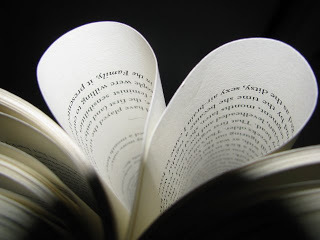
Look, I get why we romantacize the printed page. As an author, I continue to do that. You can't greet lines of readers at a bookstore and sign the Kindle editions of your book. You can't send the book you just finished to a friend across the country with a note tucked inside telling them how much you thought she might like it. You can't lovingly run your fingers along their spines as they stand on your shelves, proclaiming themselves as portals at the ready to whisk you away from your mundane life. This is why I love books. REAL books. This is why I will mourn them as they continue to their slow but inexorable death into binary oblivion. Also, those real books represent a tangible investment. Unlike the iffy leasing of digital content, your paper books belong to you.
But I would be a liar, a fraud, a hypocrite of the lowest order if I said that I wasn't helping along the demise of a centuries-old trade, because I love my little lightweight, millimeters thin miracle of an e-reader that, at the touch of a button has thousands of books ready to be loaded onto it. And that those thousands of books can be carted anywhere in this world without adding pounds of bulk to my luggage, and still be as readable. I'm reminded of when I moved to Washington and crammed every book I could fit into my suitcases and carry-on. The rest of my collection had to be left behind like old soldiers, and they were eventually put into a yard sale. It was painful. I STILL miss those books.
There are definitely drawbacks to this kind of technology, just as there were when we started adopting phones over landlines, opting for email over snail mail. I tried to stand in the way of progress, like that lone figure in Tienanmen Square before the rolling tanks, but I guess my conviction wasn't quite strong enough to keep my feet planted. And I guess that's okay. I'm definitely not alone. The book industry is going through a lot of painful contractions as it learns to adjust to this brave new world. Eventually, readers and sellers will find an equilibrium again, and by the time I'm old enough to soak my teeth in a jar on my nightstand, this conflict will seem as age old as the one that happened when The Jazz Singer came out in 1926 and showed people that they could both watch a moving picture show AND hear sound.
Still, it's probably a good idea to keep those print books if you still have them. A book is a book, after all. It's only when people stop reading altogether that we can say we're in some serious trouble. And if we really fall into the abyss, you might need all that paper to keep you warm.
Published on June 27, 2012 09:29
June 21, 2012
Dear Smashwords, It's Time We Had a Talk
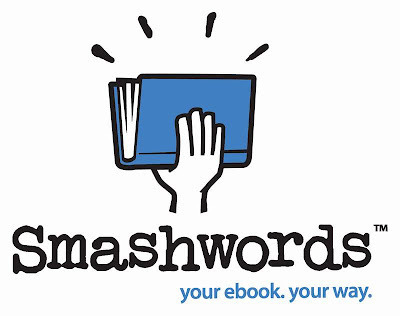
Dear Smashwords,
I am concerned about you. Yes, that's right. Concerned. I've been publishing my stories through you guys for nearly a couple years now, and in that time, you've grown a by leaps and bounds. In many ways, it's been exciting to see and be a part of. You've helped a lot of writers like me get their wares out into the world and find new fans, and I'm very thankful for that. For awhile, I was grateful that I could conduct business with several different retailers at the convenience of a single website. It saved me a lot of time and hassle upfront, even if it meant a longer wait for my books to be distributed, or for me to get paid. I also love that you offer titles so easily in multiple formats, that you make it easy to generate coupons, and that I can offer my work free as often as I want to and have it available immediately. Great stuff.
But something started to tarnish along the way. Like a kid who grows faster than his bladder can keep up and as a result wets the bed a lot, you too also grew too fast for your own good and started smelling up the joint. And though I can be patient with a kid who doesn't know better, I can't say I have the same amount of patience for you.
It all started when Apple and Sony stopped honoring my price changes. Doing free promotions across all retailers is one thing that contributed greatly to my growing readership, and ordinarily it would be an easy enough process to reverse when I was done with the giveaway. Submit price change to Smashwords, wait a week or so for the prices to change through all the retailers, contact Amazon directly and tell them to switch. Done. But then things started to get really difficult around the beginning of this year. On average, I would expect it to take a couple weeks for the price changes to happen (although, WHY we should have to wait that long is one excruciatingly annoying mystery about this whole thing), but when a month and a half had passed with no change at Apple or Sony (and with Amazon refusing to match my Barnes & Noble pricing while the other retailers were still offering it for free), I knew there was a problem.
My first resort was to contact you. But the problem with that was it took, on average, a week to hear back from you (for the record, I have only waited up to 48 hours to hear back from Amazon in all but one or two flukey instances). And when you said you did or were going to do something to fix the problem, it didn't actually work. I had no choice but to remove all my books from the Premium Catalog in order to stop the bleeding. Who knows how much money in sales that cost me in the long run. In fact, even after I pulled my titles from the catalog, I still to wait two weeks or more to see them all come down. And then one of them got stuck in limbo. I had to speak with people in your customer service department THREE TIMES regarding why one of my books was still on the Apple store two months after it should have been pulled, even when all of my other books were gone. Clearly this was an anomaly. Some technical snag. But your lack of communication with me was disconcerting and ultimately infuriating. Even when you said you were going to contact them and have them take it down ASAP, it was still WEEKS before it finally happened. Again, more money down the drain for me. But I guess in your world, As Soon As Possible is translated to mean: "about a month or so, maybe more."
Then comes the sales reporting. I'm not a genius on how this stuff works, but it's frustrating not having more accurate and up-to-date sales information from the other retailers. As of today, the last sales reporting date you have for Barnes & Noble is May 31st. Sony and Apple, June 2nd. We're entering the final week of June here. You have claimed in the past that you're working to speed up reporting times, but I haven't seen much improvement in this. To have no idea what you're selling for weeks at a time puts someone who is trying to run their own self-publishing business at a huge disadvantage. And it's enough to make someone not want to use you for your distribution services. And if that's the case, then what good are you? You even say yourself that the real benefit of Smashwords is your Premium Catalog. Well, I'm still waiting for that benefit.
Next, we have to talk about the porn. I was behind you all the way on your PayPal debacle, and I remain steadfast in my support of anyone who wants to buy, sell, or write erotica. Even the really freak-nasty stuff. It ain't my cup of tea, but then again, I don't usually have to look at it so my world is peachy keen. That is until I come to your site. Which brings me to the issue of your adult filter. It's nice that you installed an option to make it so we don't have to see such awesome titles as "Daddy Spank Me Harder" or "Three Cocks In My Mouth: Part Goo" on the front page if we don't want to. But then I've realized that turning on the adult filter has also screened out a great deal of MY titles. I write horror. Most of it is considered for adults. It doesn't contain sex, but there is some violence and gore and language. Stuff that I consider "adult" content that makes me check the box accordingly when I publish. It is astounding to me that non-incest non-smut works get blocked in your one-size-fits-all adult filter just because people don't want to see outright porn every time they visit your site. Is it THAT hard to have an X-Rated filter separate from perhaps an R-Rated one? It's the most ridiculous thing I've ever seen. Get a porn filter NOW. Or better yet, have your own smut spin-off site, because I'm really tired of having my discomfort meter spike into the red zone by seeing the incest titles mixed in with the children's books.
Finally, and this is just a minor gripe compared to the others but worth noting. And maybe it's just bad luck on my part, I dunno. But the last three or four times I've gone to upload new work onto Smashwords (and I don't upload very often), the site has been down. Or I've gotten various database errors. Not vetter errors that indicate a mistake on my part. But technical errors on your site that prevent it from working at all. It's become such a pattern that it is now a surprise when it all works the first time. Not a good sentiment to instill among users.
I've been biding my time for awhile now, eating my rage, trying to figure out the best time to write something like this, knowing that I was risking receiving a lot of ire for it, because I know you have your ardent supporters out there and the last thing I want to do is invite that into my life. But when my good will has been chipped and eroded away little by little over the course of six months, I am left with little choice but to vent my spleen, and publicly.
You're screwing the pooch, Smashwords. And at a time when you can least afford to. I have no interest in going exclusive with Amazon. Like you, I see problems around the bend in regards to giving them so much power over author's work and the publishing industry at large. But with their far superior online experience and customer service, fast and timely reporting, larger overall sales, and enjoyable shopping experience, I find it very hard to hate them. They may be the biggest fish in the pond, but they got there by not sucking. But Amazon isn't your only competition. Kobo is setting up to make a presence for themselves very soon, and Barnes & Noble's PubIt has been a viable option for awhile. Of course, I hate to pull my Barnes & Noble titles from Smashwords at this point, because I'd be sacrificing my sales rankings and frankly, I've already lost enough money due to your screw-ups, but I'm getting to the point where I'm just tired.
I'm tired of the hassle. I'm tired of the lack of communication. I'm tired of slow reporting. I'm tired of inefficient web design that forces me to view offensive content just so I can find the stuff I want to find. I'm tired of being stalled by constant errors. But most of all, I'm tired of waiting for Smashwords to finish growing up.
Published on June 21, 2012 11:56
May 28, 2012
The Color of Fiction: Are Our Books Diverse Enough?
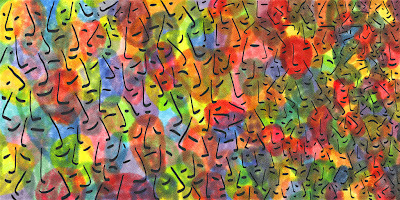
I'm no racist, but then I read articles like this and I start to wonder if I'm part of the problem. The article states that 90% of young adult books feature only white people on the cover. Hardly any minorities are represented, and forget about the disabled. In a few cases, books with black main characters had white people on the cover. That's even more disturbing.
I was saddened by this, to say the least. Imagine being a young African American (or Asian or Hispanic, or Arab, etc etc) wandering through the bookstore or library looking for something to read and seeing nobody who looks anything like you on a cover. As an overweight woman who rarely sees images of my body type representing anything other than "how NOT to look," I can say with some experience that it sucks. But the problem doesn't persist only for minorities. The lack of fiction being aimed at young males, whites and minorities alike, these days is absolutely appalling, but I'll save that post for another day.
Is it racism that causes this lack of diversity? Does one beget the other? Why is this happening?
This caused me to do a lot of thinking. I'm still thinking. I'm thinking out loud right now, actually, so if this seems disjointed or incoherent in parts, that's why. It's because I'm still trying to come to an understanding about my own role in this issue and how, or even if, I should try to do something to reconcile it.
First of all, I think the lack of minorities being represented on book covers speaks largely to a problem in the mainstream publishing industry. How many minority authors are working in popular fiction today? Probably a lot, but how many of them are widely known? Who is the black JK Rowling or James Patterson? IS there one? Sure, I can name a number of prominent black literary giants, dead or alive: (Toni Morrison, Alice Walker, Maya Angelou, Langston Hughes, Alex Haley, Richard Wright). But what about contemporary authors? Off the top of my head, I can think of Octavia Butler, Zane, Omar Tyree. But none of them are household names. I guess unless you're black.
And that's the thing, isn't it? It seems that the work of minority authors is aimed specifically at minorities, while the work of white authors is aimed at... well, everybody I guess. And white authors predominantly write white characters. That isn't something to be ashamed of. That's just the way it is, just as black authors write black characters, Asian writers write Asian characters, etc. We all write from the best place of understanding inside ourselves.
But in the publishing world, is there some belief that stories prominently featuring people of color won't sell? I think there might be. What would have happened if Twilight were about a black or even bi-racial couple? Would it have even been published? I don't think it would have. I think there is an assumption that lies in the heart of this issue that minorities simply don't read enough to justify the effort to market books that represent them, and that frightens me most of all.
So now, as a writer, I'm forced to turn to my own catalog of work and examine just how little representing I've done of minorities. While I have written several supporting characters who are of different ethnic backgrounds, I have only one main character who is non-white, and that book isn't out yet. I have contemplated writing an African American main character on a few occasions, but I've run into a few obstacles that forced me to abandon the idea. Namely that I wouldn't be able to do it right.
To me, it isn't enough to simply describe someone as black or Asian, etc, without taking into account issues of culture and language. Maybe I could leave that out, but then I would feel as if I was whitewashing them, or of making someone a certain color just to score diversity points without having to do the actual work of understanding WHY I chose to make someone a specific ethnic background. And to insert minorities into a story strictly for commercial reasons really turns me off. I'm not into pandering.
But do I even have to have a reason to make someone black or Asian or Latino? I certainly don't think of that when I'm writing white characters. Because I don't think of my characters as "white characters." They're just characters, but maybe it's that way because I'm white. I've read several stories where I had no idea a character was a minority until halfway through when a few adjectives about their appearance were dropped.
Is that appropriate or not? I have no idea. I think some people would be offended by that.
And this is why I haven't strayed beyond what I know when it comes to the cultural backgrounds of my characters. I feel like any way I cut it, I'm damned. I don't want to make a character black to appease some quota or to just make myself look good, because I think that is almost as demeaning as writing a stereotypical Butterfly McQueen caricature (unless, of course, that was supposed to the be the function of the character--it's always a delicate balance, isn't it?). There is a black female character in my Shiva Paradox book, and I'm currently writing a Japanese femme fatale in my Colt Coltrane story, but I won't lie. I'm scared to death I'm fucking it up.
I don't know if it's going to be up to me to solve the problem of diversity in the contemporary literature marketplace. That's ultimately up to the publishers, I think. I'm certain there are plenty of minority authors writing stories featuring strong minority characters that would appeal to the mainstream at large, and it sure would be nice if the publishers were making them more widely known and available to readers and stop making outdated assumptions about what people expect out of good literary characters. But until that happens, I think it's going to continue looking awfully white out there.
Published on May 28, 2012 07:26
May 25, 2012
Summer Preview and Other Awesome Updates
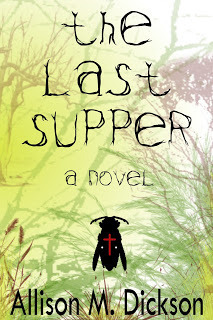
Not the actual cover.
There are lots of things coming up roses in the realm of Allison M. Dickson, Author! First and foremost, my latest novel, The Last Supper, has found a home with a great publisher! The developments are super early, and I will announce them as soon as they're a little more cemented, but I have to say that this is a huge turning point. The dream that I would be able to find a home for one of my books, especially one as near and dear to me as this one, has come true, and I'm thrilled to be able to share it with the world with a company that is as excited about it as I am. For those who don't know what it's about, here is an excerpt from the query I submitted, which should give you an idea:
What began as a few grains of pollen soon grew into a problem large enough to destroy humanity. People called them "serpent weeds," and they eventually consumed all the crops and civilization soon after. John Welland doesn't remember any of that, though. He grew up in the aftermath under the Divine Rite, a theocratic body that rose from the chaos to bring order and righteousness back to the world. Their solution was the Justification test, designed to determine one's usefulness to society. It was easy enough to pass, provided you lived cleanly, worked to your specified quota, and went to church. If you failed, you received your Last Supper, a poisoned buffet, on your doorstep with a note thanking you for your service.
But when John's wife becomes the latest casualty of Justification, his world view is shattered, and for the first time, he's considering rebellion. He and his teenage daughter are soon forced to flee the sheltered confines of their pristine village and venture into the strange, weed-eaten wasteland beyond in the hopes of seeking refuge on thecoast. Along the way, they witness the devastation the weeds have wrought upon the landscape. Animals are deformed, people are sick and dying. But there are others who have developed extraordinary abilities, the kind of powers that might just turn things in their favor. And to John's astonishment, he realizes he may just be one of them.
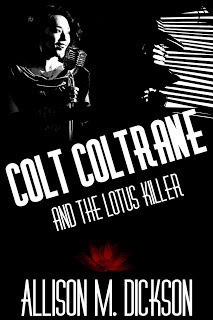
Another mock-up cover. Better ones forthcoming
On the self-publishing front (don't think I'm giving that up, because I fully intend to keep that running), I have a very exciting line of things in the pipeline. Namely, my dieselpunk noir story, Colt Coltrane and the Lotus Killer. However, I've decided to take that in a different direction. What was going to be a single full-length novel is now going to be a trilogy of novellas. I'm still working out plots and details on the other two stories, but my plan is to complete them all upfront and release one every few weeks. I'm stoked about this series, because it incorporates so many things I love. Science fiction, horror, grit, a hardass gumshoe, and robots! I really think people are going to get a kick out of it. Plan to look for the first one to drop sometime this summer. Here is the blurb from my portfolio page so you can get a taste of what to expect:
It's 1947, and Los Angeles is full of corruption, murder, and robots. Japanese dames are turning up mutilated in the LA River, almost like some creature is belching them up from beneath the city. The cops, with their fancy new robot sidekicks, can't seem to crack the case. Or maybe they don't want to. Then a mysterious lady named Komiko Takahashi shows up in Colt's office one morning. The same Takahashi that's stamped on all those shiny new LAPD 'bots. Something fishy is going on, and Komiko thinks Colt's the guy to check it out. He's not too sure at first. His days on the Force are long behind him, and it didn't end well between him and the boys in blue. But he has bills to pay and a junkie wife to care for. Also, something's eating at him about the whole thing. Something big. Colt had a lot of enemies before this all started, and it's about to get a whole lot worse.
Apart from that, the beta readers for The Oilman's Daughter should be wrapping up soon, and then that manuscript will be shipped off to Ian's agent. We're already discussing the plot for the next volume in the series and talking about releasing some short stories that take place in the same universe. I have a good feeling about this one, folks.
2012 is shaping up to be a very good year indeed.
Published on May 25, 2012 19:38
May 18, 2012
So You Want To Be A Co-Author?
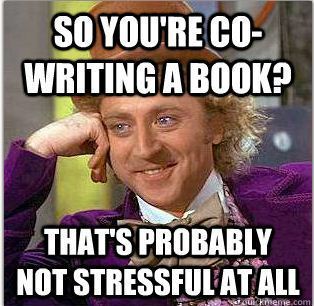
I made my own Condescending Wonka!
Now that I've finished my first ever co-authoring novel project with my good friend and colleague Ian Healy, I figured I'd come back to the ol' blog and write about the experience a little and share some of the wisdom that I've gained since joining this project nearly two years ago.
The Oilman's Daughter is an alternate history steampunk novel set in the 1930s. It's a fantastical marvel that features steam-powered spaceships, orbiting railroads, space pirates, and would-be oil barons. We got through the first act in early 2010 and took a year-long hiatus, namely due to my cross-country move and other projects that sprung up along the way, but with perseverance, we powered through it to wind up with an 85,000 word adventure that I think people are going to love.
But getting there wasn't always easy. Even though Ian and I have been working together on separate projects for years, there was still a period of struggle, at least initially on my part, as I worked to grasp the idea that he had so clearly mapped out in his head. I remember early on even considering bailing on the project and having him write it for himself, because steampunk was so foreign to me and all of the elements were so overwhelming at first, that I didn't think I'd be able to pull it off. But as the characters evolved, my comfort level increased, and every chapter I wrote became easier and easier.
So how did we do it? Here are the brass tacks:
1. Plotting. I know I've ranted against outlines and such, but in a collaborative work, they are pretty necessary so everyone can agree before the real work of writing begins. Ian plotted out the first eight or nine chapters or so before we even got started. Nothing too fancy. Just a few sentences explaining what happens. This provided a good roadmap. Eventually, I added ideas for the second act and we got that plotted out more or less together. By then, we already knew where the story was headed and how we wanted it to end. After several discussions on the topic where we bounced all kinds of ideas around, I did an initial mapping of the last act. He added his input, then I added mine and we essentially came to an agreement. We had a few bumpy moments toward the end, but we straightened it out easily enough. The book all in all was about as collaborative as it could get in terms of plotting.
2. The story has two lead characters and it's told alternately through their POVs. Ian had the valiant hero, Jonathan Orbital, and I had the gruff and menacing antihero space pirate, Phinneas Greaves. Not all collaborative novels need to be done this way, of course, but for our first time doing this, it definitely made it easier for us to have our own characters to work with. So with that in place, Ian would write a Jonathan chapter, and then I would pick up the next chapter with Phinneas, and so on and so forth.
3. When one of us would finish a chapter, we'd send it to the other for editing and proofing. If he saw some extra elements that could be added, he'd add them (thus mixing his "voice" into mine so it would sound cohesive), or he'd take anything out that sounded extraneous. And I would do the same with his chapters. Each of us would approve one another's edits before adding the clean copy to the master document. Ian was the dedicated master holder, and he would add each chapter and then send me the updated one. It helps to have one person who is the sole organizer that way.
And the method was as simple as that. The idea of doing it this way was not only to make sure the manuscript sounded unified, but also to have an essentially submission-ready copy by the time we finished the first draft. All in all, it's a much more efficient way to work.
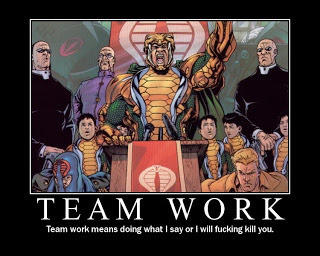
So with that said, I have a few points of advice to offer people who are thinking of trying something like this, because when it comes to working creatively with others, it can either go as swimmingly as this arrangement did, or it can quite easily end a partnership.

1. Check your ego at the door. It's hard to do, I know, but a collaboration is the quintessential definition of compromise. Ian and I didn't run into too many incidents like this, namely because he had such a firm grasp of the concept while I was still learning. So I had to trust him on a lot of it, and it all worked out for the better. But the main idea is to keep your mind open to your partner's ideas and trust them and their ability to take the story in a certain direction, even if you're not sure at first. If you can't relinquish that amount of control over the work, then you're working with the wrong partner.
2. Be organized. Projects like this have a real potential to become a complete disaster if you don't have a concrete method in place. This is why we devised the system that we did. We are also working several states apart, so it's not like we could get together in person and organize our stuff. It was imperative that we had a working system in place. Ian is really the more organized of the two of us when it comes to work, so I completely entrusted him with the handling of the master document (you really don't want to see the state of my documents and download folders right now...lol).
3. Be patient with each other. This isn't quite the same as the ego check. Instead, it's more about understanding that your partner has things going on in his or her life that might get in the way of producing. Oh, we probably could have had this thing completed a year and a half ago if we really wanted to, but we both went through periods where it just wasn't happening for whatever reason. We always knew that the book would get done eventually, even as both of us were working on several of our own projects at the same time. Maybe we'd punch out a chapter or two and go a few months without picking it up again. Either way, don't harangue or harass your partner too much about getting it done, or you may find yourself without one.
4. Write with the right person. Sounds self-explanatory, but I know plenty of people who have co-authored with folks they hardly knew, and their experiences were unnerving in many ways. However, there can also be drawbacks with writing with someone very close to you, because you might almost be too close to weather one another's criticisms. Ian and I have rarely minced words with each other when it comes to our work, so there was no problem there. But we're also highly respectful of one another's work and ideas. So when looking for a collaborator, make sure that you have an honest and frank way of dealing with one another, make sure you trust each other enough that you don't have to worry about them hamstringing you, and make sure you like each other's work. And if you can't get all of those things to come together...
5. Protect yourself. Draw up a contract that details the project in question and who will be doing what. It never hurts to put these sort of arrangements in writing, even if you completely trust the person you're working with. At the very least, it makes you feel officially committed to the project. At the worst, it protects your creative bunghole from being reamed.
Anyway, those are just a few basic pointers on the novel collaborating experience. I really enjoyed the process, and in many ways, this was easier than writing a book solo. It's nice to have someone there sharing the same vision and scratching your back as you go. It turns what is in many ways a very lonely profession into something far less so.
Published on May 18, 2012 15:35
May 16, 2012
Five Things We're Forgetting
Technology has made our lives easier, but it's also made us dumber when it comes to certain basic skills. Not that I've ever been the most hardcore DIY survivor type, but I've even found myself slipping in certain key areas over the years as I've surrendered to all of the trappings of the digital and silicon age. However, there are kids growing up now who will never have these skills to begin with. I imagine it's the difference between being born on an island and finding your way off versus being born in open water with no concept at all of land.
I don't think I'm being curmudgeonly with my concern. Okay, I get that we've all gradually lost the skills of some of our forefathers over the generations. Most people today don't know how to hunt and dress their own wild game or grow their own vegetables or put horseshoes on a horse, because we've replaced horses with cars and the hunting and gathering rituals of old with trips to the grocery store.
Of course, we might one day soon see a time when we're called upon to learn even those primitive skills again, whether we like it or not, so it's probably not a bad idea to have at least a working knowledge of such things. But the things I'm listing here are skills that are so very basic--like kindergarten basic in most cases--that the loss of them in future generations really does frighten me a little. And here they are:

Anyone still have one of these?
1. Remembering Phone Numbers: If you are under the age of, say, 21 and have memorized the numbers of all the contacts in your phone (at least the important ones like your parents/kids/spouse/closest friends), then you're a very rare bird. Most of us who have had cell phones for at least five years are probably crippled beyond recognition in this department. I used to pride myself on being able to store phone numbers in my head like a savant. I knew the numbers of most of my relatives and friends and local businesses that I called most. And when I first got a cell phone, I swore up and down that I'd never become a slave to the speed dial, because I didn't want to forget people's phone numbers. And the earlier cell phones made it easier to do that, because programming the speed dial in them was a pain in the ass. But the more advanced phones became, the easier that got. And the easier that got, the less I was dialing actual number keys.
And what's the first thing you remember happening when we lose our phones and the contacts aren't backed up? We kind of freak out, don't we? That little pocket computer is basically an externalized part of the brain that used to hold all that information pretty much intact. Or, at the very least, we'd sometimes have paper address books. I can't remember the last time I saw someone other than my grandmother use one of those bad boys.
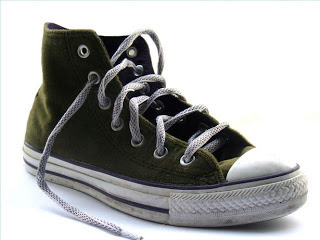
Can you imagine these shoes with velcro?
2. Tying Shoelaces: It was always a rite of passage for any kid over the age of five or so. Learning to tie that special knot meant you were one step closer to being an adult. I can tell you now that my daughter does know how to tie her laces while my son never perfected it. Not for lack of trying, mind you. He's had a few pairs of lace-ups, and he CAN get them tied eventually, but it's not just a quick job for him like it was for most kids his age back in the day. Something happened that in the short span of years between when it was time for Natalie to learn and when it was time for Elias to learn. Nearly every boy's shoe we could find in the stores was fastened with velcro.
It isn't like velcro is a new thing. It was all space age and awesome when I was a kid. But at some point, it became a monopoly. It was only when the kids started school that I realized how widespread this phenomenon was. MOST kids didn't know how to tie shoes because they'd never learned, because their shoes were all fastened with velcro. How many kids approaching their preteen years don't know how to tie a pair of shoelaces? How about the ones who are coming up through preschool now? I shudder to think.
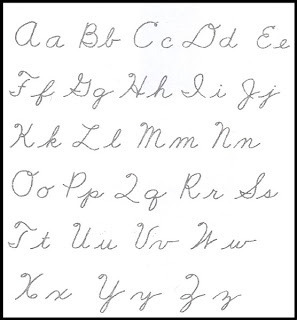
The dreaded cursive Z. Oh how I hated you.
3. Writing in Cursive: I'll just make this clear. I hate writing in cursive, so I don't. But at least I know how. The main reason I don't like doing it is because I write left-handed, and the art of teaching cursive has always been geared toward the right-handed sect. Nowadays, a lot of schools aren't even teaching it. We're doing most of our writing on keyboards now. Some say it's obsolete. Does it bother me? Yeah, actually. Even if you grow up to never use it in your daily life, you should still know cursive for the simple act of being able to read and understand it. Historical documents are in cursive (i.e. the Constitution and Declaration of Independence). People who have no concept of it will think they're reading a foreign language. Most people's signatures are created based on a use of cursive, because cursive signatures are harder to forge. Learning to write in script develops fine motor skills, the same ones they use for things like buttoning buttons and (see above) tying their shoes. Loss of fine motor skills over time could be detrimental to industries that count on it. Would you really want a surgeon whose hands operate like they're made out of LEGOs? But let's forego the practical issues at hand here. Forgetting to teach cursive rips out the opportunity for a kid to learn a skill that they might find to be fun, challenging, interesting or even beautiful. It may not be a tool they continuing to use, but they should at least be given that opportunity.
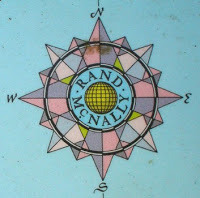
4. Reading Maps and/or Giving Directions: Why break out the Rand McNally when most modern cell phones have GPS apps, or you can pick up a TomTom for less than a hundred bucks these days? Plug in your address and listen to the talking robot tell you which way to go. Even when Mapquest was all the rage with getting from Point A to Point B, it still forced people to actually read each step of a route, and sometimes consult a map in conjunction with it when things went wrong. And honestly, I've been steered in the wrong direction by Google Maps (via the GPS app on my phone) so many times, that I've come to hate using it. However, when we drove across the country on our move from Washington state to Ohio, we didn't have the use of our phones or any data service for about 3/4 of the trip (states like Idaho, Montana, Wyoming, and South Dakota don't roll that way). And the GPS unit we had at the time didn't have the best maps pre-installed. However, we had a Trip Tick from AAA as well as a trusty road atlas, and I'm proud to say that we never once got lost. Teaching kids how to read maps is as important as ever, because you should always have a back-up plan, especially for longer trips.
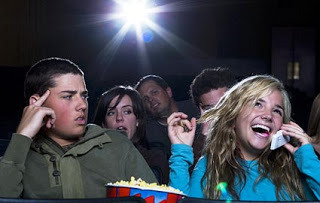
Why isn't the popcorn bucket over her head yet?
5. Social Skills and Manners: Let's face it. The internet and texting are ruining these skills for our kids. They're also ruining them for most adults. It's easy for those of us who grew up without the internet to think it won't be that bad. But I have trouble not imagining a future when today's kids grow up without the ability to to express themselves based on thoughtful and meaningful interactions they've had in their lives, through in-person or even long phone conversations. And what about empathy? The internet has a way of erecting an empathy barrier between people. Look at how people talk to one another on forums or comment threads on news articles, etc. It isn't only kids doing that, sure, but I think the problem will only become worse as those who come of age in today's world have less and less context with how to interact with people.
Even now, I struggle with talking on the phone. I used to do it all the time, but now I avoid it if I can. I don't know if this is because my introverted brain has been waiting for technology to catch up with my preferences, or if the technology itself has changed them.
And then there's the whole cellphone etiquette issue. Do I find it a sad commentary that the admonitions before the start of any movie are namely about people putting their damn phones away for two hours? Or how a group of people can rarely sit in the same room together without pulling out their phones and goofing off with them?
Of course this entire topic could take up a thesis or a book. I'm not here to be some kind of doomsday prophet. But I think it's important to at least speculate on where things are headed as things continue to change and evolve (or devolve) for humanity.
I don't think I'm being curmudgeonly with my concern. Okay, I get that we've all gradually lost the skills of some of our forefathers over the generations. Most people today don't know how to hunt and dress their own wild game or grow their own vegetables or put horseshoes on a horse, because we've replaced horses with cars and the hunting and gathering rituals of old with trips to the grocery store.
Of course, we might one day soon see a time when we're called upon to learn even those primitive skills again, whether we like it or not, so it's probably not a bad idea to have at least a working knowledge of such things. But the things I'm listing here are skills that are so very basic--like kindergarten basic in most cases--that the loss of them in future generations really does frighten me a little. And here they are:

Anyone still have one of these?
1. Remembering Phone Numbers: If you are under the age of, say, 21 and have memorized the numbers of all the contacts in your phone (at least the important ones like your parents/kids/spouse/closest friends), then you're a very rare bird. Most of us who have had cell phones for at least five years are probably crippled beyond recognition in this department. I used to pride myself on being able to store phone numbers in my head like a savant. I knew the numbers of most of my relatives and friends and local businesses that I called most. And when I first got a cell phone, I swore up and down that I'd never become a slave to the speed dial, because I didn't want to forget people's phone numbers. And the earlier cell phones made it easier to do that, because programming the speed dial in them was a pain in the ass. But the more advanced phones became, the easier that got. And the easier that got, the less I was dialing actual number keys.
And what's the first thing you remember happening when we lose our phones and the contacts aren't backed up? We kind of freak out, don't we? That little pocket computer is basically an externalized part of the brain that used to hold all that information pretty much intact. Or, at the very least, we'd sometimes have paper address books. I can't remember the last time I saw someone other than my grandmother use one of those bad boys.

Can you imagine these shoes with velcro?
2. Tying Shoelaces: It was always a rite of passage for any kid over the age of five or so. Learning to tie that special knot meant you were one step closer to being an adult. I can tell you now that my daughter does know how to tie her laces while my son never perfected it. Not for lack of trying, mind you. He's had a few pairs of lace-ups, and he CAN get them tied eventually, but it's not just a quick job for him like it was for most kids his age back in the day. Something happened that in the short span of years between when it was time for Natalie to learn and when it was time for Elias to learn. Nearly every boy's shoe we could find in the stores was fastened with velcro.
It isn't like velcro is a new thing. It was all space age and awesome when I was a kid. But at some point, it became a monopoly. It was only when the kids started school that I realized how widespread this phenomenon was. MOST kids didn't know how to tie shoes because they'd never learned, because their shoes were all fastened with velcro. How many kids approaching their preteen years don't know how to tie a pair of shoelaces? How about the ones who are coming up through preschool now? I shudder to think.

The dreaded cursive Z. Oh how I hated you.
3. Writing in Cursive: I'll just make this clear. I hate writing in cursive, so I don't. But at least I know how. The main reason I don't like doing it is because I write left-handed, and the art of teaching cursive has always been geared toward the right-handed sect. Nowadays, a lot of schools aren't even teaching it. We're doing most of our writing on keyboards now. Some say it's obsolete. Does it bother me? Yeah, actually. Even if you grow up to never use it in your daily life, you should still know cursive for the simple act of being able to read and understand it. Historical documents are in cursive (i.e. the Constitution and Declaration of Independence). People who have no concept of it will think they're reading a foreign language. Most people's signatures are created based on a use of cursive, because cursive signatures are harder to forge. Learning to write in script develops fine motor skills, the same ones they use for things like buttoning buttons and (see above) tying their shoes. Loss of fine motor skills over time could be detrimental to industries that count on it. Would you really want a surgeon whose hands operate like they're made out of LEGOs? But let's forego the practical issues at hand here. Forgetting to teach cursive rips out the opportunity for a kid to learn a skill that they might find to be fun, challenging, interesting or even beautiful. It may not be a tool they continuing to use, but they should at least be given that opportunity.

4. Reading Maps and/or Giving Directions: Why break out the Rand McNally when most modern cell phones have GPS apps, or you can pick up a TomTom for less than a hundred bucks these days? Plug in your address and listen to the talking robot tell you which way to go. Even when Mapquest was all the rage with getting from Point A to Point B, it still forced people to actually read each step of a route, and sometimes consult a map in conjunction with it when things went wrong. And honestly, I've been steered in the wrong direction by Google Maps (via the GPS app on my phone) so many times, that I've come to hate using it. However, when we drove across the country on our move from Washington state to Ohio, we didn't have the use of our phones or any data service for about 3/4 of the trip (states like Idaho, Montana, Wyoming, and South Dakota don't roll that way). And the GPS unit we had at the time didn't have the best maps pre-installed. However, we had a Trip Tick from AAA as well as a trusty road atlas, and I'm proud to say that we never once got lost. Teaching kids how to read maps is as important as ever, because you should always have a back-up plan, especially for longer trips.

Why isn't the popcorn bucket over her head yet?
5. Social Skills and Manners: Let's face it. The internet and texting are ruining these skills for our kids. They're also ruining them for most adults. It's easy for those of us who grew up without the internet to think it won't be that bad. But I have trouble not imagining a future when today's kids grow up without the ability to to express themselves based on thoughtful and meaningful interactions they've had in their lives, through in-person or even long phone conversations. And what about empathy? The internet has a way of erecting an empathy barrier between people. Look at how people talk to one another on forums or comment threads on news articles, etc. It isn't only kids doing that, sure, but I think the problem will only become worse as those who come of age in today's world have less and less context with how to interact with people.
Even now, I struggle with talking on the phone. I used to do it all the time, but now I avoid it if I can. I don't know if this is because my introverted brain has been waiting for technology to catch up with my preferences, or if the technology itself has changed them.
And then there's the whole cellphone etiquette issue. Do I find it a sad commentary that the admonitions before the start of any movie are namely about people putting their damn phones away for two hours? Or how a group of people can rarely sit in the same room together without pulling out their phones and goofing off with them?
Of course this entire topic could take up a thesis or a book. I'm not here to be some kind of doomsday prophet. But I think it's important to at least speculate on where things are headed as things continue to change and evolve (or devolve) for humanity.
Published on May 16, 2012 14:38
May 8, 2012
Allison M. Dickson Interviews Herself from 3 Years Ago
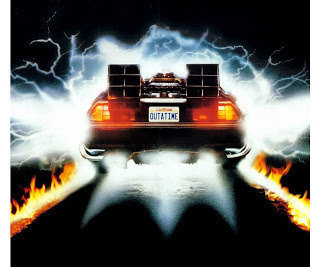
After putting the finishing touches on my manuscript for The Last Supper and mailing it off to a publisher yesterday, I sat back and I contemplated the personal enormity of what I'd accomplished. I've blogged about this before, but I don't think I've ever quite put my finger on why finally going back and completing this book has been such a gargantuan mindfuck for me.
The darker part of my mind believes I might be experiencing a bit of a grief process, because opening this book was like revisiting a part of myself that appears to have died, and finishing the book was like saying goodbye to that person forever. I don't really want to believe that, but I can't deny that's how it feels.
So I decided that the only way I was going to be able to get to the bottom of this turgid bucket of emotional turmoil was to climb into my personal Wayback Machine and venture back to the spring of 2009 so I could talk to the burgeoning wannabe author who was just in the thick of writing The Last Supper and believing unequivocally that she was on the verge of accomplishing something enormous. Luckily, that version of me (whom I will dub Allie '09 from here on out) was willing to speak to me at length--something that doesn't appear to have changed in the last 3 years. Here is the transcript:
Allie '12: Thank you for having me, Allie '09. I sure miss that writing desk you have there.
Allie '09: Oh yeah? Where are you writing now?
Allie '12: Long story. So, let's get into this story you're working on.
Allie '09 (face lights up): The Last Supper? Oh yeah, it's going to be huge!
Allie '12: You think so, huh?
Allie '09 (frowns): Well, doesn't it? I mean, you're coming to me from three years in the future. Tell me you sold it.
Allie '12: I wish I could tell you that, but I can't. I only just finished it yesterday.
Allie '09: Are you freakin' kidding me? What the hell happened?
Allie '12: A lot of things. Too many to list.
Allie '09: At least tell me I'm still writing in 2012.
Allie '12: Oh, you are. You definitely are. You will go on to write a few other novels, and you've also written a ton of short stories and managed to gain have a good number of readers and fans through self-publishing ebooks on Amazon.
Allie '09: Ebooks? Really? Those things actually caught on?
Allie '12: They sure have. Big things are slowly unfolding for you.
Allie '09: That's great! So... why don't you look happy?
Allie '12: Because I've forgotten you. I've forgotten what makes you tick. You're still so fresh and raw, and completely unafraid to get in there and tell whatever story you want however you want it. And I guess I needed to be reminded of what that was like.
Allie '09: That's funny. I never thought that way about myself. I just do what I do, and I guess always thought things would just get easier from there. I thought I would be even better.
Allie '12: In a lot of ways, you are. But I think too much now. Remember when you wrote that first novella draft of Last Supper in a day and a half? 16000 words? Remember when you wrote Aria and a bunch of other short stories one after the other? At this point in your life, it takes you about three hours to write a 6000 word short story. Your work is too long rather than too short.
Allie '09: Yeah, it's like my fingers can't move fast enough. I always compared it to creative rocket fuel. You don't do that anymore?
Allie '12: Not even close. It takes me at least five days to write a single short story anymore. Turnaround time for novels is all over the place. I wrote one novel called The Stargazers in a month, though, so at least there's that. But it was during NaNoWriMo, and it wasn't a very long book. None of my stuff is very long anymore. If anything, it always needs more.
Allie '09: Hmmm. So, what happened? What slowed you down?
Allie '12: I think I let the few small successes I've had turn me into an even bigger perfectionist than you think you are now. I've taken every piece of criticism I've ever received to heart, and it's made me afraid to trust myself. Afraid to let go. You're going to ask for a lot of help with your writing over the years, and you're going to get it, but you're also going to start thinking you don't have what it takes to do things on your own, either. It's going to stifle you. It's going to hold you back. It's going to kill your motivation to finish some really great stories. And when you do finish them, and people love them, you're never going to know how to own that accomplishment.
Allie '09: Ugh. I don't like the sound of this at all. I already have trouble owning my accomplishments.
Allie '12: Well, it's going to get worse. But maybe if you can remind me what it is that keeps you going, it can get better in the future. Why is The Last Supper is in many ways better than anything I'm writing right now?
Allie '09: ..... I guess it's because I don't think about whether or not I'm going to be rejected. I just don't care. The story is awesome and I'm having a blast writing it and imagining all the possibilities. I figure there has to be someone out there who will love it as much as I do. Don't you feel that way anymore when you write?
Allie '12: Not as much. All I can think of anymore is not getting rejected again. And self-publishing because I'm afraid of rejection, or not pushing myself because I'm afraid of rejection. Or because I think the publishing industry doesn't have any room for me. I've become cynical and jaded.
Allie '09: I'm sorry, but that's just stupid. Maybe the difference between us is that I haven't really thought at all about the industry. I'm just writing because I feel awesome when I do it and I don't care about anything else. Reading depressing things about the writing industry is just a bad idea. I think only rejected writers read or write that stuff to make themselves feel better about being rejected.
Allie '12 (sits in silence for a few minutes): You know... you're right about that. So very right. Thank you, '09. You've helped a lot.
Allie '09: I'm glad to help. For both of our sakes.
Allie '12: Can we keep in touch now and then? I really need that.
Allie '09: Sure thing. Just lighten up a little, would you? You always make things harder than they need to be. I had hoped that would get easier in the future, but I guess you're still working on it.
Allie '12: I don't know if the work will ever stop, but I guess a little perspective switch now and then is a good thing.
I get up and give '09's desk another wistful look. I miss that glass and chrome monstrosity, and the corner it used to sit in, where the lighting was perfect and the future felt almost too big and bright to hold itself in. I turn to go, but '09 has one last thing to say.
"So you say I wrote a few other novels since then. Can you tell me about one?"
I think about it for a minute and then say, "Salad-tossing vampires."
Published on May 08, 2012 09:15
May 3, 2012
Learning How to Swagger
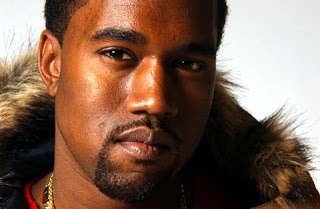
Say what you will about Kanye...he ain't hurting for confidence. Or success.
I have no swag. I can put on a good game face sometimes, but my confidence level tends to flag a lot. I am never really satisfied with anything I do.
While this in many ways keeps me striving to learn and do better, it has its drawbacks. Namely, that I stop listening to my own voice. And this is bad, no matter how you paint it. It's important to be able to take criticism with an open mind, but it's a whole other thing to listen solely to what others are telling you until you're convinced that your original vision is wrong. When you lose that kind of confidence, you can't succeed no matter what you do.

Phillip Phillips. Hasn't Compromised.
Has Never Been in Bottom 3
I see this all the time in other people. In no way is this demonstrated better than on a show like American Idol. Here we have an entire cross-section of singers, all from different backgrounds and styles. The only thing they have in common is a decent-to-great instrument. Some of them know exactly who they are, and they go out every week and rock out as if it is the most effortless thing in the world. The ones who do best, you never have to wonder if you're going to be entertained. These are the ones who bring you into their world, sit you down, and give you a show. You'll either love it or hate it, but you can never doubt for a second that what you got was sincere entertainment.

Elise Testone. Compromised Every Week.
In Bottom 3 Every Week. Has Since Gone Home
The others...the vast majority of the contestants, rather, they have no idea who they are or what they want to be. They have this ability, but they don't know how to apply it. Or, they think they know who they are until someone tells them it isn't quite right, and without even showing the slightest bit of artistic fortitude, they submit to an entire re-molding process at the request of judges and mentors and producers who just want to make money. These performers do it because they just want to be accepted, but by doing so, they've already said goodbye to who they truly are in order to become what someone else wants them to be.
Sometimes this guidance can help the right artist bloom, but most of the time, they become even more lost and confused, and before you know it, their run has ended and they fade into obscurity, because people can usually see through that kind of ruse. That's because more than pure talent, people just want entertainment. And they want it at the hands of a skilled entertainer who knows what they're doing, who probably came out of the womb knowing it.
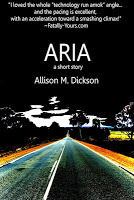
*cough*
And it's these people I admire the most. And it's these people who always give me cause to sit down and think who it is who is writing some of these stories of mine. I won't say which ones aren't me, because I don't want to affect anyone who might eventually read them. But suffice it to say, there are a few of my pieces of work that I despise more and more each day, and would take down if I didn't already think that Pandora's box had been open for too long.
But it's only a few. Most of them are me down to the bone. They have a pulse, and that pulse is mine. Other stories started out as mine, but they took on another life when I felt I needed to change them in order to be accepted, and as such, they do not reflect the kind of writer I want to be. My voice and my own particular thumbprint has been scrubbed out of them until they're virtually sterile.
And it all comes down to confidence. Knowing the kind of artist you are and not compromising on it, even when there are some people who might not agree with you. I've recently had to consider two opposing viewpoints on a book I just finished. One person thought I needed to change something. Another person didn't think it was necessary. I was so busy trying to decide between these two viewpoints when it occurred to me that I forgot to even consider my own.
When I was asked what my gut was telling me, I had to sit and think for a few minutes. What did I think? Why should I even have to think so hard about this? My voice should not be so muffled and buried! This shouldn't have taken me even 30 seconds to decide, but I had to clear my head and think about it. I had to tell myself that it was my story, I created it. What is my vision and why did I make the decision I made?
I shouldn't have to depend on other people to tell me what my vision is, even if I'm only half as competent as I think I am.
My gut told me that I did it right the first time. There may be others who won't agree, but I have to take the risk on myself and not on someone else. I have to trust myself. I have to be the one who takes you into my world and entertains you on my terms. Because if I'm doing it on someone else's, it won't come through, and I will get no joy out of the success that may come of it.
Maybe my book won't work for everyone. But even the most legendary entertainers aren't universally loved. Everyone is a critic. But the greats never compromised on what they saw was best, even if some of their closest confidants disagreed. That's the mark of someone who knows that they're doing. Even if some people think they suck, they have the swagger, and most of these people will be swaggering all the way to the bank.
I'll let you know when I find mine.
Published on May 03, 2012 21:15
May 2, 2012
If You're A Writer, Do NOT Do These 5 Highly Annoying Things

You know you wanna buy my book...Right? Right? Right?
I can't believe I'm writing this blog entry. In fact, I could swear I've written something like this before, but I'm too damn lazy to go dig it up. But it doesn't matter. My rage is fresh, and it requires a fresh blog.
Of course, you don't even have to glean these pearls of wisdom from me, because I'm 1000% positive that you will find similar and more comprehensive posts on every writing blog in existence. But when has that ever stopped me from venting my spleen?
Of course, I realize I'm wasting my time here. With the wealth of information already out there about how writers should conduct themselves on the business end of things, it's plain to see who has done their research and who hasn't, and the people who are reading this undoubtedly already know all of these things and have become the unwitting choir to whom I've decided to preach.
But if you are one of those wet-behind-the-ear newbs who is actually in the midst of some research regarding decorum and etiquette in the writing world, step on up and have a little read. While I can't promise that any of these things will ensure your success in the publishing world, they will make you look more professional, and that never hurts.
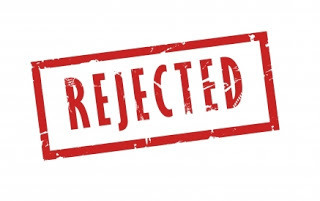
1. Do NOT reply to rejections from publishers or agents. Just don't ever do it. Ever. Never ever ever EVER. Period. People, not even the ones with wounded egos, often wonder if they should send something back to the agent or editor who has doled out a rejection letter. Even if it's just a thank-you. I'm here to save you a lot of time and worrying right now by just simply saying, "No." Don't even write back to thank them or acknowledge the receipt of said rejection. Do you have any idea how much time these people spend reading? Don't give them more nonsense to read. It will only annoy them. If you get a rejection letter, that's basically someone telling you to move along, there's nothing more to see here. I don't know how I can put it more emphatically than that. Honestly, I feel like I got a little dumber just writing this, because it should be so goddamn motherfucking self-evident, but I know it isn't, because I have heard countless stories from countless slush warriors about the doucheholes they encounter daily who just don't know how to take no for an answer. They see "No" as an invitation to keep pushing, like their manuscripts are used cars or insurance policies. What most of these writers don't realize is that the more they push back, the greater the likelihood the editor or agent is adding your name to a blacklist that will direct any correspondence from you to their trash bin. In addition, they're likely copying said blacklist to all of his or her fellow publishing colleagues warning them that you're one of "those people." The publishing world may seem infinitely large, but it is actually not. These folks know each other. And they talk. Do not be one of "those people." Be a professional, put some burn cream on your sore ass, and take your manuscript elsewhere.
Addendum: You might be asking yourself, "But what if they don't ever reply at all?" That's easy. See above.
Addendum 2: "But...but what if it's possible my email/query/manuscript got lost in the shuffle and they never actually saw it?" Highly unlikely, but in the minuscule off-chance that something like this did happen, here's what you do: See above. Tough luck. Try again with your next manuscript. Move on. Most of the time, no answer = no interest. It sucks and I wish it wasn't the case, but you can't control these things. You can only control whether or not these uncontrollable elements make you act like an unprofessional douche.
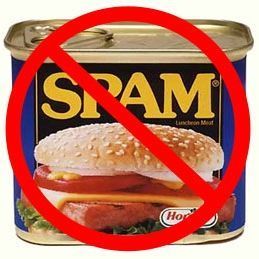
2. Do NOT spam/annoy/harass your friends/family/fellow writers into reading/buying/reviewing your books. Sure, slip it into the conversation once in awhile. We all do it. But we all know at least one person who self-promotes to the point where you're not sure there are any other words in his or her vocabulary than "Buy" and "My" and "Book." They're the kind of people you want to block from your friends list and/or ninja-punch in the nuts. They're the kind of people who you think might also stalk their exes on the side and eat raw puppies for breakfast every morning. Oh, this isn't you, Mr. Compulsive Self-Promoter? You don't eat puppies for breakfast, you say? That's a blatant use of disingenuous slandering hyperbole, you say? Well, that's what people who are harassed several times daily actually see in their minds when you corner them yet again about your "Wikked Ahsum Buk." And another thing, if you really want people to buy your book, you don't continuously market yourself to other writers. It's the readers you want to get. Why? Because there are more of them for one thing, and for another, most readers aren't spending several hours a day writing their own stories. We writers try to read what we can and help out our fellow colleagues whenever possible, but most of the time, we writers are writing, and we're trying to sell our own books, albeit with a good bit more finesse than spamming a message board ad nauseum. Also, whether anyone wants to admit it or not, we're "kinda" in competition with you. It's not like we want you to fail so that we may succeed, but let's just say that we have just as much vested interest in attracting the same readership you'd like to gain, and if you do nothing but breed resentment in us, we will likely not hesitate to squash you like annoying little gnats in our journey to the top of the heap. That's just the way it is.

3. Do NOT write an essay-like diatribe in response to a negative reviewer. Oh it's so very tempting to do that sometimes, I know. I have been there. You want the hater, the Wielder of Not Enough Stars and Love to see that they completely missed the point and misinterpreted your vision, so you type a very long comment to them on Amazon, or you take to your blog to rally your fellow crusaders on a quest to hang this ignorant fucker by their toenails. You want to do this, because you're pissed, but really you're just afraid. Afraid that others will read this bad review and completely discredit you and never buy anything you write. So you want the Negative Nancy to come around to seeing it your way and perhaps let loose another magical star or two from their pants. What you're doing, of course, when you go on such a quest is you're only amplifying the negative review, and that's the opposite of what you want. I've encountered a number of less-than-favorable reviews in my time. Some that are just plain mean and unfair, some that I KNOW showed that the reader in question just misunderstood what I wrote (and I know this because I've had enough reviews to the contrary). I so wanted to shake my finger at them and set them straight. But ZOMG what a horrible idea that would have been!
There are two rules everybody should know about the internet: the internet is forever, and people on the internet love finding other people to laugh at. If you have a public meltdown when someone completely rips you and your book a new one, guess who they'll be laughing at? You. Guess who might also decide you're too unprofessional to work with in the future? Possibly any publisher who happens to be watching. And you never know who could be watching, which is why you need to keep a lid on it in a public forum. Now, that's not to say you shouldn't seek commiseration among your trusted friends and colleagues. However, you do not want to challenge the reviewer upfront. You just don't. The only thing you will accomplish by doing so is making them hate you more. Up until your toxic spill of public sadness and indignation, they might have been considering trying something else of yours, but you can probably forget about that now. Now they're probably telling their friends what an asshole you are, and to never read anything you write. And in this cynical world, that sort of news spreads like wildfire.
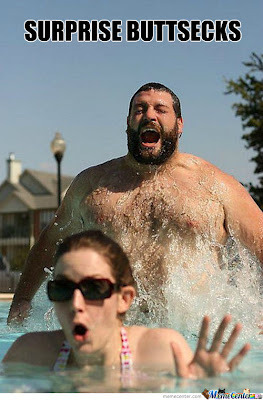
4. Do NOT send your writing and/or manuscripts unsolicited to anyone. This includes agents, publishers, BUT ESPECIALLY YOUR FELLOW WRITERS. Okay, some people might attach a short excerpt to the bottom a query letter, but this is not directed toward them. To me, that's no harm no foul kind of stuff. But there are others... others who have certain demands. Normally it's "Hey, can you read this? Like now? I went ahead and attached it. It's only like thirteen chapters and it's really rough and I have no idea what to do in this one part and need your help figuring it out. TTYL!"
I know exactly 3 people who can get away with this sort of thing, and they know who they are.
You have no idea how busy some of us are. Throwing your writing at someone who didn't ask for it first is like walking into the middle of an operating room where a doctor is up to his elbows in someone's guts, and demanding that he or she attend to you right this instant. I have almost zero time to beta read for anyone anymore aside from my closest colleagues, much as it pains me. Between having no less than two or three manuscripts of my own going at one time, I usually have one or two others that I need to read for someone else. This is in addition to any querying and marketing I'm trying to do, helping with the podcast I co-host, as well as running my household and making sure my husband and kids get the occasional home-cooked meal and a house that doesn't look like a demilitarized zone (I fail at that last one more often than I care to admit). Oh, and sleep. Don't want to forget about that, though I often do.
If you really want my opinion on something, please ask first. Don't just dump a .doc file in my inbox and assume I have even five minutes to look at it. Yes, I might be goofing off on Facebook at that given moment, but that's also my downtime, and I choose to spend my downtime away from a manuscript if at all possible. It's easier if you just send me a message. "Hey, do you think you can look at a few pages for me and tell me if they're any good at all? I really value your opinion on these kinds of things and would appreciate a few minutes of your time." If I get a message like that, I might be encouraged to find a few minutes for you. But PLEASE only send a few pages unless I've agreed to read the whole manuscript (which is rare). If you dump the whole novel in an email and zip it off to me, I'll probably dispatch an assassin to murder you while you sleep. So please just ask first. And if I say I don't have time, don't be a dick about it either.
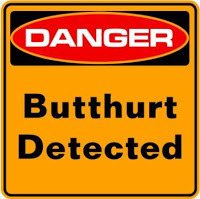
5. Do NOT ask for an opinion and then get upset when it isn't the one you want to hear. This could possibly go under #3, but this isn't quite the same as a review. In my editing experience, I've encountered two kinds of writers. There are those who are genuinely interested in the feedback and will give it genuine consideration. And there are those who are seeking an ego stroke and will throw a hissy fit if they don't get one. That is not to say that I think, as a beta reader or editor, that my word is gospel and that you will absolutely fail if you don't implement my suggestions. But it is to say that I'm not an idiot, and that when I devote my time to you, I am not going to be in the business of jerking anyone around, least of all myself. That means I'm going to read your stuff through two different filters. The first one will be as a writer, where I will objectively evaluate your storytelling technique. The second one will be as a casual reader. It will be focused more on the overall impressions the piece left on me and whether it made sense or had the proper amount of emotional impact to keep me turning the pages. The second one is far more important than the first one, in case you weren't sure, and it is the one I will use to generate most of my feedback.
At any rate, this is a lengthy and time consuming process. It often sucks away any other energy I might have to devote to my own work, so I don't take it lightly. Please, PLEASE do not piss on the efforts of those who have taken time out of the schedules for you by arguing or by telling them that their opinions are wrong. Criticism is like bitter medicine that you absolutely must swallow. Spit it out in someone else's face, and you'll be lucky if anyone will want to read a Christmas card from you, let alone your manuscript.
Published on May 02, 2012 16:27



